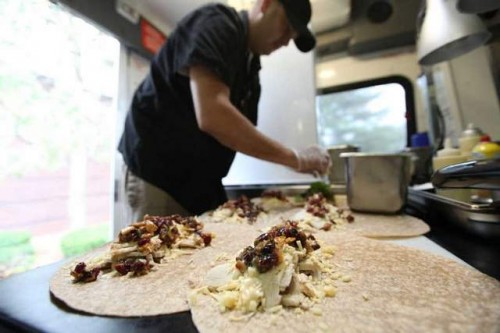 DETROIT, MI – So you think you’d like to open a food truck.
DETROIT, MI – So you think you’d like to open a food truck.
As Jeff Aquilina and Justin Kava can attest, there’s more to it than buying some wheels, bolting a flat-top to the floor and hitting the streets as vagabond chefs with a Twitter account.
There are excruciatingly detailed licensing requirements, quirky problems that real restaurants don’t have — like sloping counters when you park on a hill — and the challenges of staying open in winter.
But five months after rolling out their Concrete Cuisine gourmet food truck in Detroit’s western suburbs, the two veteran chefs look back on their experience — even the licensing gauntlet — with satisfaction and a sense of humor. They’re enjoying rave reviews for their diverse, restaurant-quality menu. And they’ve gotten used to people e-mailing to ask, “How do we open a food truck?”
“We say, ‘Start at the Health Department,’ ” says Kava.
“We don’t give them any information,” Aquilina adds.
But last week, as they prepared for the lunchtime crowd at Valassis headquarters in Livonia, they dished about what it took to get their vehicle — a former Cleveland transit bus turned ice cream truck — on the road and what they’ve learned along the way.
They started working to get their license from the Wayne County Health Department — known for its tough standards — in the spring.
“It took us three or four months,” says Kava, 32, of Livonia. “You had to come up with a plan review, the same as you would with a bricks-and-mortar restaurant. They wanted to see your whole layout. They wanted to know every single piece of equipment — dimensions, specs, where you’re buying it. You have to have a spec sheet for every single thing — the exact model.
“They wanted to know your food sources and the entire flow of the food. … We had to say we were getting the chicken, for instance, from U.S. Foods. And then it’s, ‘OK, you buy your chicken frozen. What’s your thawing-out process? How do you cook it? How do you hold it? How do you serve it?’ We had to go through every single menu item and do the exact food flow.”
And those were only a few of the requirements.
“They say you have to do this, this, this and this,” says Aquilina, 35, of Plymouth. “So you go back and do that, and keep redoing it. The final step was the lighting. We didn’t have a lighting chart. They wanted to know where the lights are going to be and what’s covering the lights.”
“We were amazed at the amount of steps,” adds Kava. Other people told them they should have gone to Oakland County, where the process is said to be easier. “But you know, it’s cool, because once you actually receive the license, you have a sense of accomplishment.”
They are veteran chefs who have worked together before, including at the Lark in West Bloomfield, when Marcus Haight was chef. Kava left there to be Haight’s sous chef in an advanced culinary program at Schoolcraft College. Aquilina later worked for Matt Prentice, serving as executive chef at Temple Israel in West Bloomfield for six years.
Cooking on a food truck isn’t exactly like being in a restaurant.
“If we’re parking on an angle, the fryer oil might go to one side,” says Aquilina. “Or you set your tongs or something down on the cutting board, and it slides. … There are a lot of little nuances that people don’t take into consideration until you live it and learn it,” he says. “But we’ve got it down to a science now. Angles are just … another angle!”
They have regular stops at office buildings in the Livonia-Farmington Hills area, participate in special events like last weekend’s Camp Casey Fest fund-raiser in Ferndale, worked last summer at area concerts and sporting events and hired out for graduation parties and other festivities.
Aquilina and Kava opened in the suburbs because they were denied a permit to work in Detroit. But a month after they were turned down, city officials gave the El Guapo Fresh Mexican Grill truck a six-month special-use permit as a kind of test case, to see how it would work. Meanwhile, the city is updating its decades-old mobile food vendor regulations.
With their success in the suburbs, Aquilina and Kava don’t necessarily want to be in Detroit regularly. “But we would like to be able to go to sporting events or festivals down there. We’d like to be a part of Detroit,” Aquilina says.
Adds Kava: “We’re hoping (El Guapo) will be successful for that reason,” so the city will want more food-truck action downtown.
While metro Detroit’s other trucks serve upscale tacos and other Mexican-inspired foods, Concrete Cuisine took a deliberately different approach to appeal to a wider audience.
Find the entire article <here>



